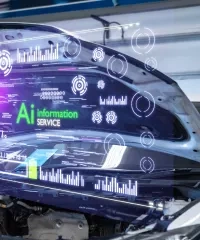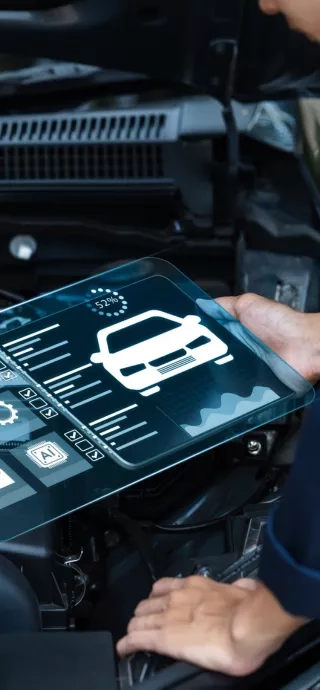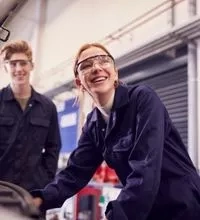Case Study: Siti Abdullah, UK & Ireland Key Account Manager, Brembo S.p.A

Tell us how you got into automotive and how your career progressed
It was by accident that I found a career in automotive. I was one of those people who really didn't know what I wanted to do. I come from a background where I was supposed to do law and when that didn’t work out, I found myself working for a company called National Service Network. That’s where I first met Kevin Finn, who is the IMI’s chair. In fact, he was my first boss in the automotive world!
That was an eye opener for me. The company was one of the first garage network service providers in the UK and came about because of the Block Exemption Regulation, where they realised there was an opportunity in the market to help business save money by using independent garages for fleet work.
I was part of the bookings team, providing a vehicle booking service from fleet drivers and booking their vehicles into independent garages across the UK.
I'd come from a call centre background and one thing that was very uncomfortable for me was hearing the phones ringing. So, I made it my personal objective, in line with a call centre mentality, to pick up that phone within three rings. But the company just exploded. We were so busy. I found myself assisting the garage authorization team as well. That was an eye-opening experience for me as well. I didn’t even know how to drive at the time, and I was talking to mechanics about taking their request for repairs. Trying to relay the message accurately and putting it into the IT system. I’m not going to pretend I didn’t make any mistakes, but it was all part of the learning curve! I very quickly realised that I was really intrigued by the design and workings of the vehicles and the more I immersed myself, the more my interest grew.
I suppose I should have realised that was my vocation because when I was a kid, I was always taking things apart and once gave myself an electric shock with one of those instant cameras!
When you discovered your interest in vehicle technology, who was it that was encouraging you to learn more or do more?
To be honest, it wasn’t just one person, it was a group of people. I was very lucky to work with some former mechanics who saw that I wanted to learn and they provided me with a lot of the knowledge and theory. Also, my team leader at that time also made time to explain to me about certain things. But being quite an inquisitive person, I took it upon myself to learn more through research and reading, and of course the famous Haynes manuals. Gosh, I was reading a lot of them!
Did you enrol in any formal training?
To be honest, at that point I didn’t know where I would access this sort of training. I was a bit lost. However, my formal training came about when I joined, other companies, so for example when I joined EuroCarparts and I started working with their technical team, they were the ones who introduced to the IMI. So, I had some training around clutch and flywheel systems, for example. I also had EV and hybrid systems training. I even had training on LuK double clutch systems. All of which were IMI certified, by the way. This gave me a sense of validation as well. I mean, I knew the theories and I’d certainly had hands on experience working for a chain of independent garages in the UK after my experience with NSN, so it was certainly good to put theory into practice at that stage. The formal training was invaluable, I think though, because a lot of what I’d been taught was perhaps more about getting the job done but maybe wasn’t the best practice examples of getting the job done.
And I certainly realized that from the courses that I attended, especially when you have issues that need resolving. I remember that we would get advice from different people, some of which made sense but then some of it really didn’t. But you’re so desperate to get the job resolved and the vehicle off your ramp and make the customer happy again that you're trying everything. But then I honestly wish that I’d had more formal training earlier. Especially around diagnosing faults correctly. I would have saved so much time.
So you wouldn't hesitate to advocate the benefits of good quality training then?
Absolutely not! I’m a trainer now and I was in Ireland last week doing a roadshow and so got a chance to speak to a few colleges, a few apprentices and a few garage owners as well. And fundamentally, once you’re out of training with the pace that technology changes, if you don’t keep in touch or up to date, it’s very easy to find yourself stranded. Really quickly out of date.
I see this sometimes with the garages I help. I specialize in brakes and the perception is that it’s a very easy subject. They might think it’s their bread and butter and that they know it inside out but 99% of time when I go out to help a garage resolve a technical issue, the fix is really easy but if they don’t know how to resolve it because they haven’t kept themselves up to date, it becomes a problem. You don’t know what you don’t know.
Tell us about your current role and what you like about it?
I'm the Key Account Manager for UK and Ireland for Brembo. I’ve been with Brembo for about two years now. I was approached by Brembo after an IAAF event. I’d always been aware of them and really admired the brand from afar. I mean, who doesn’t?!
So by chance I had some conversations where they liked what I was doing such as the best practice seminars and they wanted to transfer some of that over to Brembo. Honestly, I couldn’t say ‘yes’ quick enough!
For me, it's a fantastic brand. It's a global leader and technological innovator of breaking systems for automotive vehicles. It designs, develops and manufactures braking systems and its components, supplying the most important manufacturers of cards, motorbikes and commercial vehicles worldwide, as well as clutches and other components for racing.
Quality is a top priority for Brembo. We wouldn't have won more than 500 titles in motorsport if we didn't produce a top quality product
You’re clearly an advocate for the brand! You speak passionately about the products and what the brand represents. Is diversity and inclusion important to Brembo?
Oh, 100%! It’s one of the things that made me fall in love with Brembo. There’s such a focus on diversity as well as issues such as sustainability.
I like how the brand actively takes part in projects to seek out new talent, for example. There’s lots of great stuff going on in the background. I'm always delighted that when I'm taking a factory tour there are female engineering showing us around.
Brembo is focused on the future so topics like the environment, sustainability and diversity are not something new for us. We’ve been championing them for quite a while. It’s a very forward-thinking brand. Full of ideas about how we can not only be the brand of today, but for like tomorrow as well.
That's awesome. So apart from the brand, and the products, what else or who else inspires you to keep your automotive career moving forward?
I love being in automotive. It really satisfies the inquisitive side of me. But I would really love to see more people like me in the sector. I certainly get ‘impostor syndrome,’ especially because of the way that my career in automotive has evolved. I did the work first and then got my qualifications. When I speak to other people like myself, they’ll say things like ‘oh my goodness, I don't know how you can do that Siti’.
As a woman in automotive you do need tenacity. I think it’s important that everyone can see people like themselves in automotive to be inspired to join. I get embarrassed by being featured in magazines or promoted but I know how important it is. I appeared in a magazine when we were doing the AutoInform Roadshow in Ireland and I saw my picture on the front cover. I really didn’t like being on the front cover, but I know it’s important to have more visibility of different types of people doing this role. Diversity of gender and culture is more visible in the media and on TV now and it’s important to show the next generation of people who look like me or have similar backgrounds to me that they can have a great career in automotive too.
You can’t be it if you can’t see it,’ is often used but my nervousness about putting myself out there is because I don’t confirm to the ‘norm’ there can be negativity and it’s almost like putting a target on my own back.
You’ve experienced that negativity?
100%. Even in simple day-to-day jobs when I’m visiting garages to help resolve an issue the barriers go up immediately, just by my physical presence. They question my knowledge and experience. An example was when I was working as a clutch and transmission specialist and was trying to help out a Master Technician with an issue – when I got on site and introduced myself the response was, ‘I'm sorry, love but what the ‘eff’ do you know about clutches’. So, without event talking to me or trying to find out what I know, that person made a snap judgment and instant assumption about me.
Does this still happen now?
Oh, yeah, of course it does. It’s unusual to see people like me in garages. It’s even more unusual to see people like me providing technical support. There are a few of us out there but we’re still a novelty.
What would be your message to people with those opinions?
Most people make a judgement based on first impressions. Decades of stereotypes are ingrained in people but what I’d like to say to them is to be a bit more open and certainly more tolerant. Rather than jumping to conclusions, at least have a conversation with the person rather than letting their physical appearance dictate what you think of them or what they’re capable of.
In the technical field there are so very few females and we all specialize in different fields so there’s a sense of camaraderie between us. We lean on each other for advice. In a technical role, my knowledge and experience are constantly tested and challenged. It’s like having to prove yourself all the time. So it’s really important to have good support around you.
Talking about messages, what would your message be to young women about a career in automotive?
Well because there are so few of us there is actually a unique opportunity. You can have a great career and excel. A willingness to learn and attention to detail are massive advantages. Just being different will open a lot more opportunities. You’ll develop a strong resilience and wicked sense of humour but you’ll need a support network around you. I’ve found that people are willing to be mentors and that other women in the sector support each other. It’s like a close-knit family. We all understand what the challenges are, but we work to build each other up because of the experiences we’ve had.
You talked about the importance of having good support, so who has supported you?
I’ve been fortunate to have had many people support me with some great mentors. The one that sticks in my mind is the late Steve Fisher, who was MD of Apac. He was a true gentleman. He recognized my skills and took me under his wing and helped me develop. He inspires and motivates me.
The industry is competitive and can be aggressive and in spite of this Steve always conducted himself in a professional and gentlemanly manner and I loved that about him. Regardless of gender, he inspired professional behaviour and proved that you can make a difference by behaving like that. Before I met him I thought you could only get on if you behaved in the stereotypical way but he showed me that wasn’t the case. It’s the way I like to carry myself. It’s how I conduct myself with my customers and colleagues.
Someone else that inspires me is Hayley Pells.
I suppose I’m inspired by people who are successful in their own right, but are a little bit different, and who are doing things the right way.
I’m also inspired by all of the new technologies coming out. I’m on tenterhooks when I see new developments. I get really excited!
Looking to the future, what’s next for you and your career?
The next three to five years is about really focusing on building up the brand to achieve its full potential. Making sure that Brembo is accessible and improving brand penetration.
I have big ambitions for the brand. This is the brand that makes 80% of the brakes for vehicles in the world. With all the new technology coming there needs to be a transference of knowledge and information to the aftermarket. Because if there's no education on how to deal with the new technology and how to diagnose issues that occur from that technology, then there’s a huge part of the industry that's going to get left behind. We need the sector to grow with us and that’s going to be a huge task but watch this space!
You’re now part of the IMI’s Diversity Task Force. How important is that to you?
It’s really important. It’s important to have different points of view. I’d like to show people how great it can be when you work together. I think it’s an important story to tell.
If I could help change anything it would be the first impression stereotypes. I always want to apply my knowledge to assist someone and just want people to set their assumptions aside. I can’t tell you how much time I waste trying to convince some people that I know what I’m doing when I’m just there to help!
Also, there's a lot of anxiety for people like me to join the industry. When I talk to some of my friends about the things I see and hear they’ll ask me how I cope with it all. But if I can help give women who are interested in joining the industry the benefit of my experience and ways to deal with situations then that would be awesome.
Change isn’t going to happen overnight. There have been many times when I've been upset by a situation. But I’m resilient and can move on. I’ve learned to treat negativity as character development and remember that other peoples’ comments aren’t a reflection on me, they’re a reflection on them.





